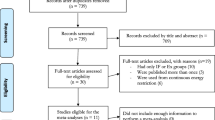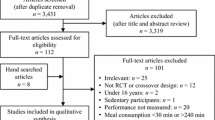Abstract
Background
Some physiological responses such as circulating glucose as well as muscle performance show a circadian rhythmicity. In the present study we aimed to quantitatively synthesize the data comparing the metabolic adaptations induced by morning and afternoon training.
Methods
PubMed, SCOPUS, and Web of Science databases were systematically searched for studies comparing the metabolic adaptations (> 2 weeks) between morning and afternoon training. A meta-analysis was performed using random-effects models with DerSimonian–Laird methods for fasting blood glucose, hemoglobin A1c (HbAc1), homeostatic model assessment (HOMA), insulin, triglycerides, total cholesterol, low-density lipoprotein (LDL), and high-density lipoprotein (HDL).
Results
We identified 9 studies with 11 different populations (n = 450 participants). We found that afternoon exercise was more effective at reducing circulating triglycerides [standardized mean difference (SMD) − 0.32; 95% confidence interval (CI) − 0.616 to − 0.025] than morning training. Moreover, afternoon tended to decrease fasting blood glucose (SMD − 0.24; 95% CI − 0.478 to 0.004) to a greater extent than morning training.
Conclusion
Metabolic adaptations to exercise may be dependent on the time of day. Morning training does not show superior effects to afternoon exercise in any of the analyzed outcomes. However, afternoon training is more effective at reducing circulating triglyceride levels and perhaps at reducing fasting blood glucose than morning training.
The study was preregistered at PROSPERO (CRD42021287860).



Similar content being viewed by others
11. References
Qian J, Scheer FAJL. Circadian system and glucose metabolism: implications for physiology and disease. Trends Endocrinol Metab. 2016. https://doi.org/10.1016/j.tem.2016.03.005.
Degaute JP, van de Borne P, Linkowski P, Van Cauter E. Quantitative analysis of the 24-hour blood pressure and heart rate patterns in young men. Hypertension. 1991. https://doi.org/10.1161/01.hyp.18.2.199.
Bailey SL, Heitkemper MM. Circadian rhythmicity of cortisol and body temperature: morningness–eveningness effects. Chronobiol Int. 2001. https://doi.org/10.1081/cbi-100103189.
Boudreau P, Yeh WH, Dumont GA, Boivin DB. A circadian rhythm in heart rate variability contributes to the increased cardiac sympathovagal response to awakening in the morning. Chronobiol Int. 2012. https://doi.org/10.3109/07420528.2012.674592.
Kennaway DJ, Owens JA, Voultsios A, Boden MJ, Varcoe TJ. Metabolic homeostasis in mice with disrupted Clock gene expression in peripheral tissues. Am J Physiol Regul Integr Comp Physiol. 2007. https://doi.org/10.1152/ajpregu.00018.2007.
Douglas CM, Hesketh SJ, Esser KA. Time of day and muscle strength: a circadian output? Physiology (Bethesda). 2021. https://doi.org/10.1152/physiol.00030.2020.
Mirizio GG, Nunes RSM, Vargas DA, Foster C, Vieira E. Time-of-day effects on short-duration maximal exercise performance. Sci Rep. 2020. https://doi.org/10.1038/s41598-020-66342-w.
Pedersen BK, Saltin B. Exercise as medicine—evidence for prescribing exercise as therapy in 26 different chronic diseases. Scand J Med Sci Sports. 2015. https://doi.org/10.1111/sms.12581.
Gabriel BM, Zierath JR. The limits of exercise physiology: from performance to health. Cell Metab. 2017. https://doi.org/10.1016/j.cmet.2017.04.018.
Gomez AM, Gomez C, Aschner P, Veloza A, Muñoz O, Rubio C, Vallejo S. Effects of performing morning versus afternoon exercise on glycemic control and hypoglycemia frequency in type 1 diabetes patients on sensor-augmented insulin pump therapy. J Diabetes Sci Technol. 2015. https://doi.org/10.1177/1932296814566233.
Sevilla-Lorente R, Carneiro-Barrera A, Molina-Garcia P, Ruiz JR, Amaro-Gahete FJ. Time of the day of exercise impact on cardiovascular disease risk factors in adults: a systematic review and meta-analysis. J Sci Med Sport. 2023. https://doi.org/10.1016/j.jsams.2023.03.004.
Moholdt T, Parr EB, Devlin BL, Debik J, Giskeødegård G, Hawley JA. The effect of morning vs evening exercise training on glycaemic control and serum metabolites in overweight/obese men: a randomised trial. Diabetologia. 2021. https://doi.org/10.1007/s00125-021-05477-5.
Ezagouri S, Zwighaft Z, Sobel J, Baillieul S, Doutreleau S, Ladeuix B, Golik M, Verges S, Asher G. Physiological and molecular dissection of daily variance in exercise capacity. Cell Metab. 2019. https://doi.org/10.1016/j.cmet.2019.03.012.
Casanova-Vallve N, Duglan D, Vaughan ME, Pariollaud M, Handzlik MK, Fan W, Yu RT, Liddle C, Downes M, Delezie J, Mello R, Chan AB, Westermark PO, Metallo CM, Evans RM, Lamia KA. Daily running enhances molecular and physiological circadian rhythms in skeletal muscle. Mol Metab. 2022. https://doi.org/10.1016/j.molmet.2022.101504. (Epub 2022 Apr 22).
Savikj M, Stocks B, Sato S, Caidahl K, Krook A, Deshmukh AS, Zierath JR, Wallberg-Henriksson H. Exercise timing influences multi-tissue metabolome and skeletal muscle proteome profiles in type 2 diabetic patients—a randomized crossover trial. Metabolism. 2022. https://doi.org/10.1016/j.metabol.2022.
Brooker PG, Gomersall SR, King NA, Leveritt MD. The efficacy of morning versus evening exercise for weight loss: a randomized controlled trial. Obesity (Silver Spring). 2023. https://doi.org/10.1002/oby.23605.
Savikj M, Gabriel BM, Alm PS, Smith J, Caidahl K, Björnholm M, Fritz T, Krook A, Zierath JR, Wallberg-Henriksson H. Afternoon exercise is more efficacious than morning exercise at improving blood glucose levels in individuals with type 2 diabetes: a randomised crossover trial. Diabetologia. 2019. https://doi.org/10.1007/s00125-018-4767-z.
Page MJ, McKenzie JE, Bossuyt PM, Boutron I, Hoffmann TC, Mulrow CD, Shamseer L, Tetzlaff JM, Akl EA, Brennan SE, Chou R, Glanville J, Grimshaw JM, Hróbjartsson A, Lalu MM, Li T, Loder EW, Mayo-Wilson E, McDonald S, McGuinness LA, Stewart LA, Thomas J, Tricco AC, Welch VA, Whiting P, Moher D. The PRISMA 2020 statement: an updated guideline for reporting systematic reviews. BMJ. 2021. https://doi.org/10.1136/bmj.n71.
Menek MY, Budak M. Effect of exercises according to the circadian rhythm in type 2 diabetes: Parallel-group, single-blind, crossover study. Nutr Metab Cardiovasc Dis. 2022. https://doi.org/10.1016/j.numecd.2022.04.017.
Chiang SL, Heitkemper MM, Hung YJ, Tzeng WC, Lee MS, Lin CH. Effects of a 12-week moderate-intensity exercise training on blood glucose response in patients with type 2 diabetes: a prospective longitudinal study. Medicine (Baltimore). 2019. https://doi.org/10.1097/MD.0000000000016860.
Kim HK, Furuhashi S, Takahashi M, Chijiki H, Nanba T, Inami T, Radak Z, Sakamoto S, Shibata S. Late-afternoon endurance exercise is more effective than morning endurance exercise at improving 24-h glucose and blood lipid levels. Front Endocrinol (Lausanne). 2022. https://doi.org/10.3389/fendo.2022.957239.
Mason SA, Keske MA, Wadley GD. Effects of vitamin C supplementation on glycemic control and cardiovascular risk factors in people with type 2 diabetes: a GRADE-assessed systematic review and meta-analysis of randomized controlled trials. Diabetes Care. 2021. https://doi.org/10.2337/dc20-1893.
Viechtbauer W. Conducting meta-analyses in R with the metafor package. J Stat Softw. 2010. https://doi.org/10.18637/jss.v036.i03.
Pérez-Rodríguez M, Huertas JR, Villalba JM, Casuso RA. Mitochondrial adaptations to calorie restriction and bariatric surgery in human skeletal muscle: a systematic review with meta-analysis. Metabolism. 2023. https://doi.org/10.1016/j.metabol.2022.155336.
Higgins JPT, Green S (editors). Cochrane handbook for systematic reviews of interventions Version 5.1.0 [updated March 2011]. The Cochrane Collaboration, 2011. http://www.handbook.cochrane.org.
Moola S, Munn Z, Tufanaru C, Aromataris E, Sears K, Sfetcu R, et al. Chapter 7: systematic reviews of etiology and risk. In: Joanna briggs Inst Rev manual Joanna Briggs Inst. 2017. https://doi.org/10.46658/JBIMES-20-08.
Fragkos KC, Tsagris M, Frangos CC. Exploring the distribution for the estimator of Rosenthal’s ‘fail-safe’ number of unpublished studies in meta-analysis. Commun Stat Theory Method. 2016. https://doi.org/10.1080/03610926.2015.1109664.
Mancilla R, Brouwers B, Schrauwen-Hinderling VB, Hesselink MKC, Hoeks J, Schrauwen P. Exercise training elicits superior metabolic effects when performed in the afternoon compared to morning in metabolically compromised humans. Physiol Rep. 2021. https://doi.org/10.14814/phy2.14669.
Teo SYM, Kanaley JA, Guelfi KJ, Marston KJ, Fairchild TJ. The effect of exercise timing on glycemic control: a randomized clinical trial. Med Sci Sports Exerc. 2020. https://doi.org/10.1249/MSS.0000000000002139.
Lian XQ, Zhao D, Zhu M, Wang ZM, Gao W, Zhao H, Zhang DG, Yang ZJ, Wang LS. The influence of regular walking at different times of day on blood lipids and inflammatory markers in sedentary patients with coronary artery disease. Prev Med. 2014. https://doi.org/10.1016/j.ypmed.2013.10.020.
Arciero PJ, Ives SJ, Mohr AE, Robinson N, Escudero D, Robinson J, Rose K, Minicucci O, O’Brien G, Curran K, Miller VJ, He F, Norton C, Paul M, Sheridan C, Beard S, Centore J, Dudar M, Ehnstrom K, Hoyte D, Mak H, Yarde A. Morning exercise reduces abdominal fat and blood pressure in women; evening exercise increases muscular performance in women and lowers blood pressure in men. Front Physiol. 2022. https://doi.org/10.3389/fphys.2022.893783.
Krčmárová B, Krčmár M, Schwarzová M, Chlebo P, Chlebová Z, Židek R, Kolesárová A, Zbyňovská K, Kováčiková E, Walker S. The effects of 12-week progressive strength training on strength, functional capacity, metabolic biomarkers, and serum hormone concentrations in healthy older women: morning versus evening training. Chronobiol Int. 2018. https://doi.org/10.1080/07420528.2018.1493490.
van der Velde JHPM, Boone SC, Winters-van Eekelen E, Hesselink MKC, Schrauwen-Hinderling VB, Schrauwen P, Lamb HJ, Rosendaal FR, de Mutsert R. Timing of physical activity in relation to liver fat content and insulin resistance. Diabetologia. 2022. https://doi.org/10.1007/s00125-022-05813-3.
Yusuf S, Hawken S, Ounpuu S, Dans T, Avezum A, Lanas F, McQueen M, Budaj A, Pais P, Varigos J, Lisheng L, INTERHEART Study Investigators. Effect of potentially modifiable risk factors associated with myocardial infarction in 52 countries (the INTERHEART study): case-control study. Lancet. 2004. https://doi.org/10.1016/S0140-6736(04)17018-9.
Brito LC, Peçanha T, Fecchio RY, Rezende RA, Sousa P, Silva-Júnior DAN, Abreu A, Silva G, Mion-Junior D, Halliwill JR, Forjaz CLM. Morning versus evening aerobic training effects on blood pressure in treated hypertension. Med Sci Sports Exerc. 2019. https://doi.org/10.1249/MSS.0000000000001852.
Schönke M, Ying Z, Kovynev A, In Het Panhuis W, Binnendijk A, van der Poel S, Pronk ACM, Streefland TCM, Hoekstra M, Kooijman S, Rensen PCN. Time to run: Late rather than early exercise training in mice remodels the gut microbiome and reduces atherosclerosis development. FASEB J. 2023. https://doi.org/10.1096/fj.202201304R.
Hargreaves M, Spriet LL. Skeletal muscle energy metabolism during exercise. Nat Metab. 2020. https://doi.org/10.1038/s42255-020-0251-4.
Martin RA, Esser KA. Time for exercise? Exercise and its influence on the skeletal muscle clock. J Biol Rhythms. 2022. https://doi.org/10.1177/07487304221122662.
Montero D, Cathomen A, Jacobs RA, Flück D, de Leur J, Keiser S, Bonne T, Kirk N, Lundby AK, Lundby C. Haematological rather than skeletal muscle adaptations contribute to the increase in peak oxygen uptake induced by moderate endurance training. J Physiol. 2015. https://doi.org/10.1113/JP270250.
Teo SYM, Kanaley JA, Guelfi KJ, Dimmock JA, Jackson B, Fairchild TJ. Effects of diurnal exercise timing on appetite, energy intake and body composition: a parallel randomized trial. Appetite. 2021. https://doi.org/10.1016/j.appet.2021.105600.
Covassin N, Singh P, McCrady-Spitzer SK, St Louis EK, Calvin AD, Levine JA, Somers VK. Effects of experimental sleep restriction on energy intake, energy expenditure, and visceral obesity. J Am Coll Cardiol. 2022. https://doi.org/10.1016/j.jacc.2022.01.038.
Larsen P, Marino F, Melehan K, Guelfi KJ, Duffield R, Skein M. Evening high-intensity interval exercise does not disrupt sleep or alter energy intake despite changes in acylated ghrelin in middle-aged men. Exp Physiol. 2019. https://doi.org/10.1113/EP087455.
Frimpong E, Mograss M, Zvionow T, Dang-Vu TT. The effects of evening high-intensity exercise on sleep in healthy adults: a systematic review and meta-analysis. Sleep Med Rev. 2021. https://doi.org/10.1016/j.smrv.2021.101535.
Acknowledgements
We acknowledge Miguel Lopez García for his help with organizing the searches performed in the present study.
Author information
Authors and Affiliations
Corresponding author
Ethics declarations
Conflicts of interest
The authors declare that they have no conflict of interest.
Funding
The present study did not receive any specific funding.
Data Availability Statement
Data originated during the research project are available on request from the corresponding author (rcasuso@uloyola.es).
Author Contributions
R.A.C. designed the study and carried out the statistical work; R.A.C. and P.G.-L. interpreted the data; R.A.C. and P.G.-L. drafted the manuscript. All the authors contributed to developing, editing, and approving the final version of the paper. All authors have read and agreed to the published version of the manuscript.
Supplementary Information
Below is the link to the electronic supplementary material.
Rights and permissions
Springer Nature or its licensor (e.g. a society or other partner) holds exclusive rights to this article under a publishing agreement with the author(s) or other rightsholder(s); author self-archiving of the accepted manuscript version of this article is solely governed by the terms of such publishing agreement and applicable law.
About this article
Cite this article
Galan-Lopez, P., Casuso, R.A. Metabolic Adaptations to Morning Versus Afternoon Training: A Systematic Review and Meta-analysis. Sports Med 53, 1951–1961 (2023). https://doi.org/10.1007/s40279-023-01879-0
Accepted:
Published:
Issue Date:
DOI: https://doi.org/10.1007/s40279-023-01879-0




